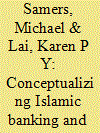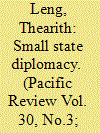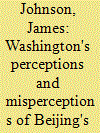|
|
|
Sort Order |
|
|
|
Items / Page
|
|
|
|
|
|
|
| Srl | Item |
| 1 |
ID:
152097


|
|
|
|
|
| Summary/Abstract |
In response to the limited engagement with critical social science concerning the governance of Islamic banking and finance (IBF), this paper compares and conceptualizes the development and governance of IBF in Malaysia and Singapore. We argue that IBF governance in Malaysia and Singapore can be distinguished on the basis of ethnic politics, moral suasion, product demand, product innovation, and the character of state practices. Concerning the latter, we contend that the political economy of both countries can be characterized as broadly involving a ‘neoliberal-developmentalism’, but we nuance this by positing a transition in Malaysia from a ‘semi-developmentalism’ in the 1980s to what we call an ‘Islamic and internationalising ordoliberalism’ beginning in the 2000s. In turn, the governance of IBF in Singapore involves a combination of neoliberal developmentalism, which nonetheless also entails some form of Islamic ordoliberalism.
|
|
|
|
|
|
|
|
|
|
|
|
|
|
|
|
| 2 |
ID:
152095


|
|
|
|
|
| Summary/Abstract |
The Singaporean polity has created the ‘militarized civilian’. This policy phenomenon beckons the question: How is this cross-fertilization carried out in Singapore's civil–military relations? Militarization is in the first sense meant to inculcate a calibrated dual personality within the civilian whereby being an effective soldier requires indulging in simulated military suffering as a badge of pride; at the same time, the citizen soldier has to believe that military and civilian values are perfectly interchangeable and contribute equally to the maintenance of peace. In a second sense, militarization is equally about permanently ritualizing sacrifices for a communitarian defence. We argue that while mostly successful, militarization also produces the tension arising from the need to appear pugnaciously vigilant while avoiding the casualties that must logically arise from heightened simulated combat. This tension is explained through two dimensions of ongoing crises: the parameters of a politically dramatized National Service ritual; and the constant propaganda of geopolitical dangers threatening the Republic.
|
|
|
|
|
|
|
|
|
|
|
|
|
|
|
|
| 3 |
ID:
152094


|
|
|
|
|
| Summary/Abstract |
This paper revisits the sinking of a South Korean naval ship called the Cheonan in March 2010, which profoundly undermined the security environment around the Korean peninsula. Employing an interactionist perspective in analysing the foreign policy behaviour of the Lee Myung-bak government and other key players at the time of the incident, the paper offers new insights into the debate over the mysterious sinking of the Cheonan. The paper reveals that the Lee government's use of the Cheonan tragedy to create a social structure that would pressure the North Korean government was only partly successful due to the counter-roles played by other relevant states.
|
|
|
|
|
|
|
|
|
|
|
|
|
|
|
|
| 4 |
ID:
152096


|
|
|
|
|
| Summary/Abstract |
This paper aims to analyse why Indonesia projects democracy as a state identity by taking on the role of democracy promoter? This paper argues that Indonesia's aspiring role as a democracy promoter is not a manifestation of a firm and coherent democratic political culture, which is more likely to be a permanent feature of states. Thus, rather than seeing it as firmly established state identity, instead, Indonesia's democratic identity should be seen as role conception articulated by foreign policy elites in its quest for international prestige. Its role as a democracy promoter has enabled Indonesia to enhance its other roles conceptions such as a regional leader in Southeast Asia as well as a bridge-builder at the global level. However, this paper further argues that Indonesia's role as a democracy promoter has also been hindered due to the inter-role conflicts arising from its enactment of multiple roles. As a result, Indonesia's enactment of the role as democracy promoter has relatively less impactful towards democratization in the region. To substantiate this argument, the paper examines Indonesia's strategies in promoting democracy and human rights in three case studies, namely Indonesia's role in mainstreaming human rights in ASEAN, Indonesia's democracy promotion through the Bali Democracy Forum, and Indonesia's engagement towards democratization in Myanmar.
|
|
|
|
|
|
|
|
|
|
|
|
|
|
|
|
| 5 |
ID:
152093


|
|
|
|
|
| Summary/Abstract |
Cambodia's foreign policy behavior towards Vietnam can be characterized as using a strategy of ‘hedging’, whose nature is different from the one suggested in the existing literature. Such a strategy can be discerned from Cambodia's omni-directional policy responses, ranging from economic pragmatism, limited bandwagoning, binding engagement and soft-balancing. Furthermore, the case of Cambodia's foreign policy towards Vietnam suggests that non-state actors, such as the opposition party and the population (voters) play a significant role in shaping the state's foreign policy, even though it is formed under the authoritarian ruling party. This study also suggests that the foreign policy decisions of an authoritarian state are not solely shaped by the personal attributes of their leader.
|
|
|
|
|
|
|
|
|
|
|
|
|
|
|
|
| 6 |
ID:
152091


|
|
|
|
|
| Summary/Abstract |
This paper examines whether the US is in a position to adopt restrictive commercial measures against China in order to complement military balancing. It focuses on the necessary condition for serious economic measures against an adversary: the state needs to be sure that it can effectively diminish the adversary's economic performance more than its own. This essay suggests that Washington cannot ascertain that this necessary condition is met in its relations with China. Thus, it might be better for the US to avoid restricting trade with China in any meaningful way, even though bilateral security rivalry intensifies.
|
|
|
|
|
|
|
|
|
|
|
|
|
|
|
|
| 7 |
ID:
152092


|
|
|
|
|
| Summary/Abstract |
When do anti-base movements manage to influence policy, and when do they fail to do so? Base scholars have largely overlooked what I argue is a significant factor that can shape public and government response to anti-base movements: political opportunities associate with framing efforts by key actors involved. Based on two cases of anti-base movements in South Korea, I show how framing battles between activists and media shape political opportunities afforded to anti-base movements and can ultimately influence movement success.
|
|
|
|
|
|
|
|
|
|
|
|
|
|
|
|
| 8 |
ID:
152090


|
|
|
|
|
| Summary/Abstract |
Washington has become increasingly concerned that Beijing's anti-access area-denial (A2-AD) capabilities will put at risk US military assets and forward forces operating in the Western Pacific region, enabling China to deter, delay and deny US intervention in future regional conflict and crisis. US defence analysts in their assessments have frequently, and often erroneously, conflated a Chinese operational capability with an underlying strategic intention that conceptualises the United States as its primary (if not sole) target. The central argument this article proffers is that US perceptions of A2-AD have been framed by specific analytical baselines that have overlooked the evolution of Chinese operational and doctrinal preferences, and over-reliant upon military material-based assessments to determine Beijing's strategic intentions, and formulate US military countervails. The article concludes that the strategic ambiguities and opacity associated with Chinese A2-AD capabilities and its ‘active defence’ concept reinforced Washington's reliance upon capacity-based assessments that in turn, exacerbated misperceptions confounded by cognitive bias of Chinese strategic intentions. The critical framing assumptions of this article draw heavily upon the ideas and rationale associated with the international relations ‘Security Dilemma’ concept.
|
|
|
|
|
|
|
|
|
|
|
|
|
|
|
|
|
|
|
|
|